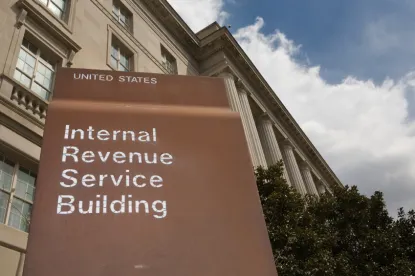The Internal Revenue Service (IRS) recently issued Revenue Procedure 2016-44, which modifies and expands certain safe harbors for management contracts with tax-exempt entities, which safe harbors were originally established by the IRS in 1997.
Generally, facilities financed using the proceeds of tax exempt bonds (henceforth referred to as “Facilities”) may not be used by non-exempt entities, as doing so would impermissibly provide the non-exempt entity with the benefits of the tax-exempt bonds. If such “private use” exceeds certain thresholds, the interest on the bonds which were sold to finance the Facility may become taxable to the holders.
Tax-exempt borrowers therefor need to be careful with respect to any arrangement, whether in writing or not, which permits taxable entities to use their Facilities. Contracts of particular concern include professional services agreements (agreements with physician groups for the operation and management of emergency rooms, radiology departments, pathology labs, etc.), food service agreements, laundry service agreements, sponsored research agreements, parking management agreements, and other contracts which permit a non-exempt entity to operate within a Facility.
In Revenue Procedure 97-13, the IRS established certain safe harbors for management contracts. Arrangements falling within those safe harbors are not counted toward the maximum amount of private use allowed at a Facility. These safe harbors limited management contracts both with respect to duration and method of compensation. Historically, the safe harbors which allowed for long-term contracts were rarely used, as they required that compensation be fixed at the commencement of the contract for the entire duration of the contract. Contracts which did allow for compensation to be based on a percentage of revenues or on a per-unit or capitation basis, by contrast, were limited to rather short terms. The particular safe harbors under Revenue Procedure 97-13 were as follows:
|
Fee Structure |
Contract Terms |
|
95% Periodic Fixed Fee |
Including all renewal options, the lesser of (i) 80% of the reasonably expected useful life of the Facility, or (ii) 15 years. |
|
80% Periodic Fixed Fee |
Including all renewal options, the lesser of (i) 80% of the reasonably expected useful life of the Facility, or (ii) 10 years. |
|
Any of (i) at least 50% Periodic Fixed Fee, (ii) a capitation fee, or (iii) a combination of a Periodic Fixed Fee and capitation fee. |
Including all renewal options, 5 years. The contract must be terminable by the qualified user (the tax-exempt borrower which owns the Facility) without penalty or cause at the end of the third year of the term. |
|
Either (i) a per unit fee, or (ii) a combination of Periodic Fixed Fee and a per unit fee. |
Including all renewal options, 3 years.The contract must be terminable by the qualified user without penalty or cause at the end of the second year of the term. |
|
Any of (i) a percentage of fees charged, (ii) a combination of a per unit fee and a percentage of revenue or expense fee, or (iii) during a start-up period, a percentage of gross revenues, adjusted gross revenues, or expenses. |
Including all renewal options, 2 years. The contract must be terminable by the qualified user without penalty or cause at the end of the first year of the term. This option is available only with respect to contracts under which the service provider provides services to third parties, and only during the initial start-up period of a Facility where there have been insufficient operations to establish a reasonable estimate of annual gross revenues and expenses. |
The safe harbors for management contracts have remained largely unchanged since 1997, save for some modifications in 2014 to account for accountable care organizations (ACOs) and to provide a measure of additional flexibility with respect to certain short-term arrangements.
With Revenue Procedure 2016-44, the IRS has done a thorough rewrite of the safe harbor provisions applicable to management contracts. The new safe harbor is generally applicable to any arrangement which satisfies the following requirements:
-
The payments to the service provider under the management contract are reasonable compensation for the services rendered during the term of the contract.
-
The contract must not provide the service provider with a share of net profits from the operation of the Facility.
-
The contract must not impose upon the service provider the burden of bearing any share of net losses from the operation of the Facility.
-
The term of the contract, including all renewal options, is not greater than the lesser of (i) 30 years, or (ii) 80% of the weighted average reasonably expected useful economic life of the Facility.
-
The tax-exempt borrower must exercise a “significant degree of control” over the Facility. This requirement is met if the contract requires that the tax-exempt borrower approve the Facility’s annual budget, capital expenditures, property dispositions, rates charged for use of the Facility, and the overall nature and type of use made of the Facility.
-
The tax-exempt borrower must retain the risk of loss upon damage or destruction of the Facility.
-
The service provider must agree not to take any tax position inconsistent with any of the foregoing (for example, by claiming depreciation with respect to any portion of the Facility).
-
The service provide must not have any role or relationship with the tax-exempt borrower that limits the tax-exempt borrower’s ability to exercise its rights under the contract. Under Revenue Procedure 2016-44, this requirement is deemed met if the service provider holds less than 20% of the voting power of the governing body of the tax-exempt borrower, the governing body of the tax-exempt borrower does not include the chief executive officer (or equivalent) of the service provider, and the chief executive officer of the service provider is not the chief executive officer of the tax-exempt borrower or any of its related parties.
While the new safe harbors provide significantly more flexibility by allowing for a broader range of compensation arrangements over longer contract terms, they will require that new agreements be scrutinized to insure that they contain provisions memorializing (i) a service provider’s agreement not to take inconsistent tax positions, and (ii) a tax-exempt borrower’s retention of control over budgeting, rate-setting, and the overall nature and type of use made of the Facility.
Any contract under which a taxable entity will be able to utilize a portion of a Facility should be thoroughly reviewed for compliance with the new Revenue Procedure, and existing arrangements should be reviewed to confirm compliance with the new safe harbors, especially as such arrangements come up for renewal.



 />i
/>i

